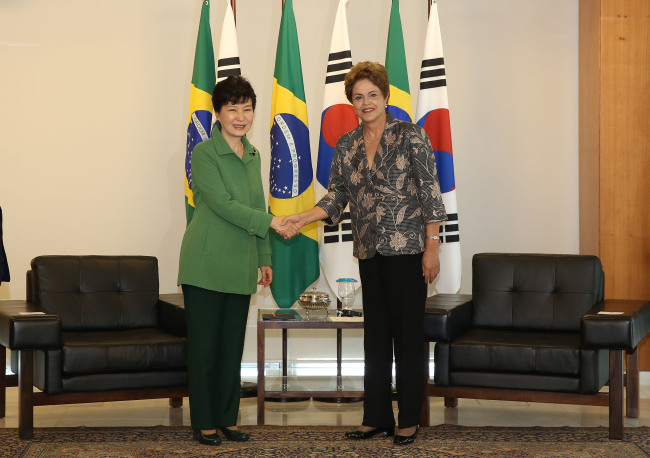President Park Geun-hye and her Brazilian counterpart, Dilma Rousseff, agreed Friday to strengthen their countries' partnership by diversifying cooperation.
"(South Korea and Brazil) can become ideal partners in expanding cooperation in such high value-added areas as infrastructure, smart grids, renewable energy and health care," Park said in a news conference with Rousseff following their summit in Brasilia. Smart grid technology is designed to increase power system efficiency.
 |
President Park Geun-hye (left) shakes hands with her Brazilian counterpart, Dilma Rousseff, before their summit in Brasilia on Friday. (Yonhap) |
The summit -- the first between the two leaders -- came as South Korea is pushing to secure greater access to South America's biggest economy.
South Korean officials hail South and Central America as a continent of opportunities that could give a much-needed boost to Asia's fourth-largest economy.
Rousseff said Brazil and South Korea also agreed to cooperate in renewable energy to cut emissions of heat-trapping gases that scientists blame for global warming.
South Korea has been seeking to go green by slashing carbon emissions, switching to renewable energy sources and ending its heavy reliance on fossil fuels.
South Korea and Brazil signed a set of memorandums of understanding (MOU) calling for cooperation in a broader range of areas, including telemedicine and job training. Park and Rousseff
observed the signing of some of the MOUs following their summit.
South Korea said it expects its young skilled professionals to make inroads into Brazil's manufacturing and information and technology sectors through the exchange of skilled workers.
The move comes four months before Sao Paulo hosts the WorldSkills competition, the world's largest professional education event held every two years.
Separately, South Korea said it will set up a "K-move center" in Brazil to help young people get jobs in Central and South American countries. So far, South Korea has been running such centers in seven countries, including the United States and Japan.
Park has recently challenged young South Koreans to seek jobs in foreign countries at a time when college graduates are struggling to find work at home.
The unemployment rate for young people between the ages of 15 and 29 stood at 10.7 percent in March, down from 11.1 percent a month earlier, according to government data.
A private MOU signed on the sidelines of the summit calls for bilateral cooperation in nurturing business startups of young, aspiring entrepreneurs.
Samsung Electronics Co., the world's top smartphone maker, plans to invest about US$5 million over the next five years to support promising startups in Brazil.
Also Friday, Park and Rousseff agreed to make efforts for the denuclearization of North Korea, though they did not offer any specific details. Brazil has diplomatic relations with South and North Korea.
North Korea, which has conducted three nuclear tests, has repeatedly vowed to develop its economy and nuclear arsenal in tandem in defiance of international pressure.
After the summit, Park traveled to Sao Paulo where she met with hundreds of business leaders of the two countries.
Park called for joint efforts between the two countries to revitalize trade. Bilateral trade between the countries stood at US$15.2 billion in 2013, up from $9 billion in 2009.
She also voiced hope that South Korean companies can participate in building an airport, a high-speed railway and other infrastructure projects in Brazil (Yonhap).








